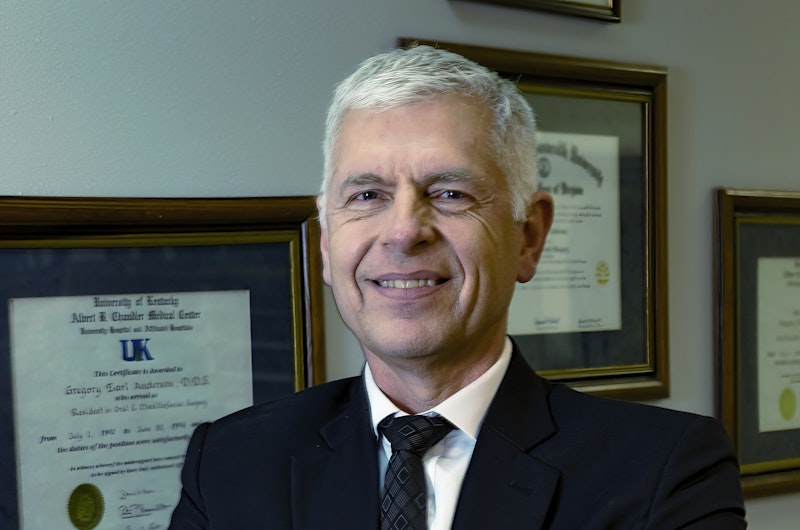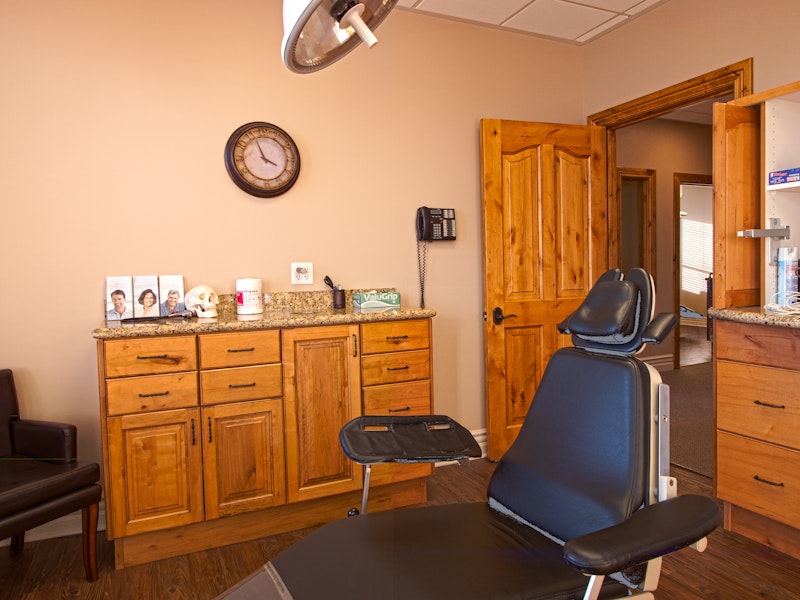TMJ Treatment
An unbalanced bite not only makes speaking and chewing more difficult, but can also mean persistent jaw pain, inflammation, and headaches in the form of a TMJ disorder.
Garland and Logan, UT, oral surgeon Dr. Gregory E. Anderson offers bite guards and oral surgery to help alleviate discomfort.
Learn more about temporomandibular disorders and how our services can improve your quality of life during a consultation with Dr. Anderson. Schedule yours today.
Do I Need Surgery?
/
Typically, your treatment will begin with a bite guard. If it does not provide relief within six months, you and Dr. Anderson can begin exploring TMJ surgery as an option to alleviate your pain. Both treatments are typically covered by insurance. Our oral surgeon has operating privileges at multiple hospitals to make treatment more convenient.
What Is TMJ Disorder?
Everyone has a temporomandibular joint (TMJ) on each side of the mouth, acting like a sliding hinge for the jaw. Temporomandibular joint disorder (TMD) occurs when your bite is misaligned, the disc in the temporomandibular joint becomes eroded, or the cartilage is damaged.
Let's take a closer look at how temporomandibular disorders occur...

Why Patients Choose Us For Advanced TMJ Care
Comprehensive TMJ Care
Dr. Anderson has been in practice for 25 years, and he is the most established TMD treatment provider in the area. He uses advanced technology and several effective options to provide long-term relief.
Affordable Costs
We charge 20-25% less than other local providers to make care available to as many patients as possible. We accept CareCredit® financing and offer in-house financing; we don't charge a service fee if any type of payment is made monthly.
Accept Most Insurance Plans
We accept most insurance plans and Medicaid. With Medicaid, patients put 20% down and make payments on the balance; if the balance is paid every month, there is no service fee.
Immediate Relief
By eradicating the most common symptoms of this condition, including headaches, jaw pain, and facial pain, you can permanently address the discomfort that affects your day-to-day well-being. Patients who receive care can also protect their jaw muscles and jaw joints from future progressive damage and strain.
Long-Term Health Benefits
When realigning your jaw, Dr. Anderson can protect your teeth from excessive wear and expensive restorative dental work. Additionally, if non-surgical options prove ineffective, surgical treatment can achieve longer-lasting relief than home remedies or over-the-counter anti-inflammatory medications.
Enhanced Quality of Life
If you suffer from the debilitating symptoms of TMJ disorder, you know how they can affect your mood, prevent you from participating in certain activities, and undermine your overall quality of life. Temporomandibular disorder treatment can reduce or even eliminate these symptoms, allowing you to enjoy life to the fullest.
Dr. Anderson Provides Quality Surgical Care To Treat Your TMJ
In the event that a bite guard does not alleviate your TMD, oral surgery may help.
Once six months have passed, you can consider oral surgery to improve your TMJ symptoms. This procedure is done under general anesthesia, so that you do not feel any discomfort during your treatment.
You also have a trusted oral surgeon ready to help: board-certified oral and maxillofacial surgeon Dr. Anderson. He has operating privileges at several hospitals–Logan Regional, Bear River Valley, Cache Valley, and Brigham City Community, providing you flexibility and convenience during your treatment.

How Treatment Can Provide Relief
5 Stars From Logan Patients
Greg is so knowledgeable and skilled. He's an excellent surgeon. He has completed many procedures for myself and my family. Highly recommended!
View on GoogleDr. Anderson and staff were so nice and helpful! They were efficient but thorough for the exam and were able to answer all my questions. I would definitely recommend their office to friends and family!
View on GoogleTemporomandibular Joint Treatment Work With a Board-Certified Specialist
In addition to being fully trained in administering IV sedation, Dr. Anderson is a board-certified oral surgeon who has been practicing in Utah since 1994. Dr. Anderson's extensive background and advanced training allow him to treat a diverse range of dental health and jaw issues. Because he offers surgical care, he can often treat your TMJ case without referring you to an outside specialist.
Our temporomandibular joint care is comprehensive, convenient, and can prevent long-term damage to your jaw muscles, teeth, and overall health. To relieve your discomfort and start enhancing your quality of life, visit one of our conveniently located offices in Garland or Logan, UT. Contact us online or:

Call Us: (435) 755-5000
What Causes TMJ Disorder?

A Combination of Factors
While the exact cause of a person's TMJ can be difficult to determine, pain may be due to a combination of elements. It's widely believed that genetics, arthritis, jaw movement, and jaw injury can play a role in developing a TMD.

Diagnosing Your Unique Condition
When you visit our Garland or Logan, UT, dental offices, Dr. Anderson will perform a comprehensive examination to discover the underlying cause of your TMD, and prescribe the most effective method of therapy.
You Could Have Undiagnosed TMD
TMD is extremely common. The National Institute of Dental and Craniofacial Research estimates that TMJ disorders affect over 11 to 12 million Americans. However, TMJ disorder has different causes, such as arthritis and injury, and results in different symptoms among patients. Many people don't even notice certain symptoms like bruxism (tooth grinding) or feel that their level of discomfort is not that serious.
However, undiagnosed TMD can have lasting effects on your oral health. That is why it is highly recommended that you schedule a consultation if you are experiencing symptoms, notice something different about your bite, or tend to excessively clench your jaw. After a thorough examination, Dr. Anderson can determine whether TMJ disorder treatment is the best course of action.

Get Professional Help at Our Logan Office If You Are Experiencing Certain Symptoms
Unexplained Pain
Patients diagnosed with TMD have frequent headaches from excessive tension in the jaw. This tension often radiates outward, causing back, shoulder, or neck pain.
Tooth Sensitivity
Clenching and grinding your teeth is a common symptom of TMD. If you notice tooth sensitivity or abnormally worn or loose teeth, you may be suffering from bruxism and TMJ disorder.
Jaw Trouble
Some patients notice trouble chewing, speaking, or fully extending their jaws. If you notice a clicking noise when you open and close your mouth that is accompanied by discomfort, seek a professional's opinion on your temporomandibular joint condition.
Worried About Seeking Treatment for Your TMJ Issues? Relax: Many Therapies for TMD Are Non-Surgical
Splints and Injections
Many people experiencing TMJ pain hesitate to seek care because they are worried that treatment may require surgery. However, this is not always the case. Some temporomandibular joint pain can be alleviated with conservative options like splint therapy and steroid injections.
Sedation Options for Your Comfort
If your unique case requires surgical intervention, you have no cause to worry. We help you relax by offering intravenous (IV) sedation at our Logan, UT, oral surgery practice. For more extensive procedures performed in a hospital setting, we also offer general anesthesia.
More 5-Star Reviews "I received the greatest care and service here."
I received the greatest care and service here with Dr. Anderson. His team of nurses and the doctor himself was very forthcoming with everything they were going to do and attentive to every concern and need I had. Highly recommend for dental work.
View on GoogleVery welcoming! Dr. Gregory and his team make you feel right at home. State of the Art office. They explain all the options with you and are great at answering your questions. Haven’t spent much time with them yet but I am looking forward to the privilege to do so.
View on GoogleHow to Prepare for TMJ Surgery
Dr. Anderson will first have you try a TMJ splint or other non-invasive treatment methods before recommending jaw surgery.
Utah Patients Trust Dr. Anderson To Treat Their Temporomandibular Disorders
The service was absolutely comfortable. I wasn't expecting the time to go so fast, but Dr Anderson and his staff were so kind, and very professional. So far, my healing process has been a breeze, and very little pain. Would recommend anyone needing services to go see him.
View on GoogleDr Anderson is phenomenal! He made my little one feel very comfortable and eased this worried mama. He is very personable and extremely kind. We definitely recommend him!
View on GoogleTMJ Problems Are Common Many Can Benefit From TMD Treatment
If You're One of the 12% of Americans With TMD Dr. Anderson Can Help You Find Relief
From trouble opening your mouth to intense pain, temporomandibular disorders can affect every moment of your life.
Though the discomfort radiating from your jaw joint can leave you feeling isolated, it may help you to know that 12% of Americans also struggle with TMJ issues and TMD.
If you experience problems with your temporomandibular joint, there's someone who can provide you with the TMJ care you need: Dr. Anderson.
After your consultation and X-rays of your jaw joint, he may confirm a TMJ diagnosis — and begin your TMD treatment.
Ready to take control of your TMJ issues? Contact our Logan office or call
(435) 755-5000

What If I Don't Have TMJ Problems?
It can be discouraging and stressful trying to find a diagnosis, especially if you're in pain.
Even if you don't have TMJ problems or a TMD, you may have another condition that needs treatment. Fortunately, Dr. Anderson is also qualified to diagnose and treat fractures and facial injuries.
So, even if you don't have TMJ, you may still find the answers and care you need with our Logan-area team.
TMJ FAQ
I think my child has a TMJ disorder. Can Dr. Anderson help?
Yes! TMJ disorders can affect people of all ages, and Dr. Anderson wants to help anyone who suffers from them. He'll likely recommend first exploring a conservative option, like splint therapy or pain-relieving injections. If your child is currently undergoing orthodontic treatment, he may want to wait a bit and observe whether that care makes a difference for your child's symptoms, but he can provide useful advice and exercises to relax the jaw muscles and ease discomfort in the meantime.
I have sleep apnea and use a CPAP machine. Can I use an oral splint for TMD too?
Using a CPAP machine and a TMJ splint at the same time can compromise the effectiveness of both treatments and may actually make both conditions worse. Dr. Anderson will recommend you try an option like jaw manipulation or steroid injections to relieve TMJ symptoms without affecting your sleep apnea treatment plan. Certain lifestyle changes can improve both conditions. Dr. Anderson can discuss them with you during a consultation.
I wear a denture that doesn't fit quite right. Could it be causing my jaw pain?
Yes, it certainly could. A denture that slips or slides frequently can keep the jaw in a state of tension or improper position, which can cause TMJ symptoms. Dr. Anderson has relationships with excellent restorative dentists throughout Utah. He can connect you with one of them so they can design and fabricate a new denture that fits properly, looks great, and doesn't cause you pain.
More Excellent Reviews From Logan, Garland, and Beyond
Friendly staff from start to finish. The Doctor is a PRO!! HIGHLY RECOMMEND!
View on GoogleThey were really good and made sure i was comfortable with no pain
View on Google





